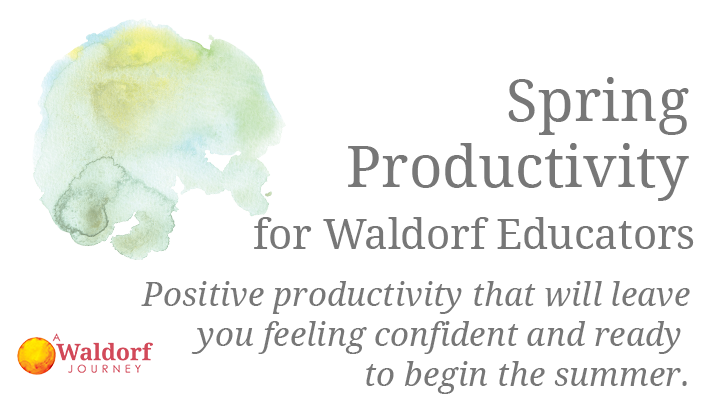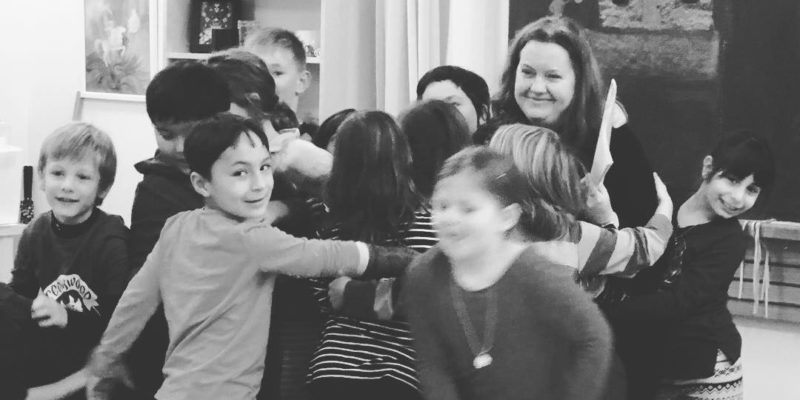For the past few days I’ve been working on planning the last few weeks of the school year. This is our first week back after spring break and with everything that’s going on, I got ready to hit the ground running.
Every year I’m amazed by how, no matter how much I plan ahead, the spring is SUCH a busy time of year!
Maybe it’s because our spring break is such a nice, long, rejuvenating break from the every day that I get a little lost in that luxury.
Maybe it’s because the end of the year feels so close I can almost taste it.
But this year is different. For the past week I have been planning our last (10!) weeks of school and getting SUPER clear on what I need to focus on. I’m feeling so ready to jump into productivity mode this spring and get everything done.
So, what am I focusing on?
Waldorf Spring Curriculum Planning
Well, first of all, I’ve spent the last week planning curriculum for the rest of the school year. I don’t know about you, but usually my summer planning runs out sometime around February. From that point on I really depend on the breaks to figure everything out. I mean, I have a general idea of what we’re doing, but I still need to read stories, plan lessons and work through the details. That’s what I’ve been doing during the second half of spring break.

This year, we’re heading back after the break with a math block. (Once again, I’ve been using my favorite math resource.) We’re going to give some solid attention to times tables, division, addition and subtraction facts and I’ll end the block with an introduction to regrouping. I promise to write another curriculum-focused blog post — with more info about 2nd grade math — soon.
With this work done, my lessons will move forward in their usual one-foot-in-front-of-the-other way and I can give my attention to all of the little extras.
What are those little extras, you ask? That’s what this blog post is about. Here’s my brief list.
- Summer Professional Development
- Student Assessment
- Working Through Individualized Learning Plans
- Spring Parent-Teacher Conferences
- Writing Reports
- Planning the Summer
Professional Development
I recently wrote a blog post all about the various professional development options that are available to Waldorf teachers in the summer. I strongly recommend checking out that post.
But beyond going out there and seeing what is available, I like to begin the process of choosing professional development with a pretty thorough look inward. I think it’s really important to take an honest look at your teaching — your strengths and strivings — before deciding what training to attend.
Many Waldorf teachers just automatically sign up for the next year’s “Art of Teaching” course. And don’t get me wrong, those courses are great — and pretty essential if you’re teaching a grade you haven’t taught before. But I know that there are plenty of teachers out there who would realize that there are other aspects of their teaching that would benefit from some training.
If you’re the kind of person who really loves curriculum development, odds are you don’t need an Art of Teaching course. Maybe take a look at classroom management, working with learning differences or getting a specialized training in a particular focus area.
For me, with the big projects of the 3rd grade curriculum looming large, I plan on giving some good attention to classroom management and maybe even a course on the domestic arts!
Student Assessment
My first few years of teaching I was so overwhelmed with everything that was going on during the spring that I told myself I would just wait until school got out to write my end of year reports. I completely put the task on the back burner, didn’t think about it at all, and immersed myself in the teaching.
The problem was that when it finally came time to think about those reports, I didn’t have the data I needed to be able to effectively write them. I mean, I had my notes about my students and my own informal observations, but if I had thought about it, I would have created a formalized process for assessing their skills BEFORE school got out.
Luckily, I realized it about a week before school got out and I quickly notified all of the parents that I was going to keep their students’ work for a few weeks into the summer. After the reports were done I sent out word that reports and student work was available for pick-up in the classroom.
Thankfully my class parents were supportive, but it’s far better to collect the data ahead of time!
Last year I put together a form that I used to check in on my students’ progress. This form then became a rubric chart in the end-of-year report. If you’re interested in using the chart I made, I’ll send it to you if you put your email address in the box on this page.
Working through Individualized Learning Plans
One of the best things about being a Waldorf teacher is that you know almost exactly the students you’ll see in your classroom on the first day of school. This means that we have a huge advantage over those teachers who have to wait until September to respond to the group and make plans for supporting student learning.
I realized a few years ago that doing the work of assessing my students in the spring leads SO naturally into putting together support plans for students who need them. I often meet with the parents of those students at regular intervals throughout the school year, and it’s good to meet in the spring, have a plan to move forward with in the fall, so you can really hit the ground running when the school year begins.
Now, I’m always open to the growth that can happen over the summer, so those plans need to be checked in with and possibly adjusted in the fall, but to do the work now will make a huge difference. It’s hard to write a support plan for a student you haven’t seen in three months. Use the informed perspective you have now and put together a plan
Spring Parent-Teacher Conferences
I’ve actually never understood why almost every Waldorf school I’ve encountered holds parent teacher conferences in the week before Thanksgiving — in November. That’s always felt far too early in the year to really be effective.
Though the spring may not be the ideal time to meet when you’re looking to make some real progress in skill-development, it is the best time to reconnect with families and make sure you’re all on the same page when it comes to supporting student growth.
A wise teacher told me years ago that you should never say anything in the end-of-year report that you haven’t already said to the parents. Nothing in that report should be news. It should instead be a formal document that simply documents the common understanding that you and parents have.
It’s tough to fit them all on the calendar, but it’s totally worth it. Having those conferences on the calendar will ensure that you do the work leading up to it, which will make writing those reports a breeze. Speaking of writing reports . . .
Writing Reports
I know many teachers who absolutely commit to having their end-of-year reports completed by the last day of school. Though I’ve never managed to do it myself — I just haven’t made it a priority — I sure admire those teachers who do!
But even if you’re not going to have your reports completed by the last day of school, there’s plenty of preliminary work to do. I usually like to settle on a format for the report and I do the work of gathering information ahead of time.
I recently put together a little one-video mini-course all about How to Write an End of Year Report Your Class Parents Will Love. I think it’s really helpful and you’ll get a lot out of it. Just put your email address below and I’ll send you the link.
Planning the Summer
Finally, spring is the time to make your summer plans. I’ve found that unless I go into the summer with a clear plan, it’s far too easy for those endless summer days to fritter away. I’ve been sitting down with my calendar, blocking out time for trainings, vacations and school prep days.
You know you’re a busy Waldorf teacher when you have to schedule your down time.
If you’re interested in getting a little guidance with all of these topics and walking through them, step-by-step, with me and a small cohort of Waldorf teachers, check out my Spring Productivity Course.
This 6-week course goes through all of the topics above and shares resources and guiding ideas for giving each one of them your attention. We’ve got a great group already forming and this format works really well for busy teachers. You can find more information about the program here. I hope you’ll join us.





Leave a Reply